2019 Events
November 2019
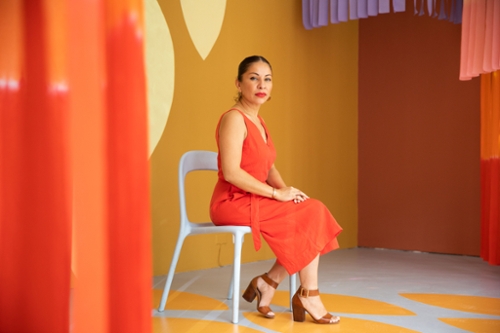 Michelle Ortiz
Michelle Ortiz
Visual artist, muralist, community arts educator and immigrant rights activist Michelle Angela Ortiz introduced the Brandeis community to her Familias Separadas project — a series of public art installations in Philadelphia and Harrisburg, Pennsylvania, about the horrific impact of family separations and detention.
This event was sponsored by the Minor in Creativity, the Arts, and Social Transformation (CAST) and cosponsored by the Fine Arts and English departments.
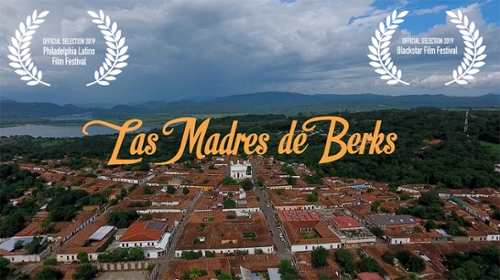 Michelle Angela Ortiz screened her 30-minute documentary, "Las Madres de Berks," a film that shares the testimonials of four Central American mothers detained for two years with their children at The Berks County Residential Center, a family prison in Pennsylvania. It also featured the artworks that Ortiz created based on the Berks mothers' stories, and is part of Ortiz' "Familias Separadas" public art project which amplifies the stories of families affected by detention and deportation in Pennsylvania. The screening was followed by a conversation with the artist.
Michelle Angela Ortiz screened her 30-minute documentary, "Las Madres de Berks," a film that shares the testimonials of four Central American mothers detained for two years with their children at The Berks County Residential Center, a family prison in Pennsylvania. It also featured the artworks that Ortiz created based on the Berks mothers' stories, and is part of Ortiz' "Familias Separadas" public art project which amplifies the stories of families affected by detention and deportation in Pennsylvania. The screening was followed by a conversation with the artist.
This event was sponsored by the Minor in Creativity, the Arts, and Social Transformation (CAST) and cosponsored by the Fine Arts and English departments.
October 2019
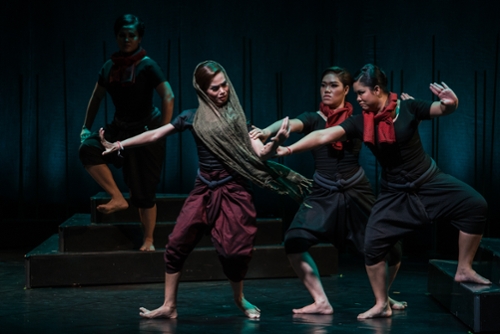 Sophiline Arts Ensemble Performing Phka Sla; Choreography by Sophiline Cheam Shapiro
Sophiline Arts Ensemble Performing Phka Sla; Choreography by Sophiline Cheam Shapiro
Photo Credit: Sophiline Arts Ensemble
This two-part lecture/demonstration featured Cambodia-based award-winning choreographers. Sophiline Cheam Shapiro, part of the first generation to learn and revive Cambodian classical dance following the genocide in her country, will discuss choreography in late-20th and early-21st century Cambodia, and the relationship between legacies of violence and contemporary expressive culture. She focused on a dance-drama she developed as a reparations project of the Extraordinary Chambers in the Courts of Cambodia — the specially constituted court trying Khmer Rouge leaders for crimes against humanity and genocide. Prumsodun Ok — a former student and protégé of Sophiline's, born to Khmer refugees in the U.S. — shared his story of countering enduring forces of conflict through the founding of the first all-male gay classical dance company in Cambodia.
This event was sponsored by the Minor in Creativity, the Arts, and Social Transformation (CAST) at Brandeis University and cosponsored by the Master's Program in Conflict Resolution and Coexistence and the Office of Diversity, Equity and Inclusion.
"The process of paying attention to poetry, listening to a voice that seems to come from nowhere in the midst of turbulent inner seas, is very much like sorting through the storms of protracted conflicts." — Paul Lederach
The internationally recognized peace builder John Lederach came to campus at the end of October 2019. John talks quite a bit about how, for him, poetry — haiku in particular — has been a place to recharge and reflect for his more political work. In this hour-long discussion, we read excerpts from John's book, took time to write together, and shared our experiences of how the focus of writing poems can refill the wells that oftentimes get drained through activist work of all kinds.
We read excerpts of "The Moral Imagination," in which Lederach talks about what poetry has meant to him, discuss how his words apply to our own work, write, and think about "writing as respite" — as a place where activists can recharge and reflect and consider things through a different lens.
Liz Bradfield, a professor of creative writing at Brandeis, led the discussion and writing exercises.
July 2019
Hosted by the International Teaching Artist Conference (ITAC)
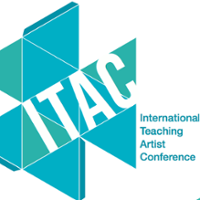 During the Think Tank discussion hosted by the International Teaching Artist Conference (ITAC) on the emerging field of Art, Culture and Conflict Transformation" (ACCT), IMPACT colleagues Cynthia Cohen, Mary Ann Hunter from Tasmania, and Carmen Olaechea from Argentina explored the emerging field of ACCT and intersections of education, arts and peacebuilding.
During the Think Tank discussion hosted by the International Teaching Artist Conference (ITAC) on the emerging field of Art, Culture and Conflict Transformation" (ACCT), IMPACT colleagues Cynthia Cohen, Mary Ann Hunter from Tasmania, and Carmen Olaechea from Argentina explored the emerging field of ACCT and intersections of education, arts and peacebuilding.
May 2019
A celebration took place with the graduating seniors and graduate students whose work had been an integral part of the Ethics Center, as well as those fulfilling the minor in CAST.
The 2019 event honorees included: Amna Ahmed, Armine Avetisyan, Abby Bergman, Julia Brown, Gemma Curnin, Yuval Derry, Vidit Dhawan, Ece Esikara, Alexander Feldman, Klaina Gomez, Andrew Jacobson, Alyssa Kann, Kate Kesselman, Samantha Lauring, Siwar Mansour, Madison Matthews, Santiago Montoya, Remony Perlman, Jean Poulard, Hannah Recknor, Sage Rosenthal, Elisabeth Shaller, Doron Shapir, Ravi Simon, Brandon Stanaway, Hannah Sussman, Maxwell Tang, Sarah Terrazano and Yiyi Wu.
Artists' Theater of Boston (ATB) partnered with Boston-area residents who have experienced eviction and displacement to create a new work exploring gentrification, loss of community and local memory, and the fight to have a home. "This Place/Displaced" weaves together stories of advocacy, change, and resistance by eight playwrights including Kirsten Greenidge (Obie winning "Milk Like Sugar"), David Valdes Greenwood (IRNE nominated "Bully Dance"), and MJ Halberstadt (Eliot Norton Award winning "Losers, or The Launch Prize"), with original music by composer Max Kennedy.
Directed by Josh Glenn-Kayden, artistic associate and casting director at Company One Theatre, "This Place/Displaced" is a timely reflection of Boston's need to prioritize equity and justice for all its residents. Following its August run at the Charlestown Working Theater, ATB brought the production to Brandeis, accompanied by conversations with anti-displacement activists, playwrights, and company members, and opportunities to advocate for just communities.
Sponsored by the Minor in Creativity, the Arts, and Social Transformation (CAST) with financial support from the Max and Sunny Howard Memorial Foundation (through the support of Naomi Sinnreich, P’13)
April 2019
Followed by: Rhythm, Rhyme & Revolution: A Workshop on the Arts as a Tool for Resiliency
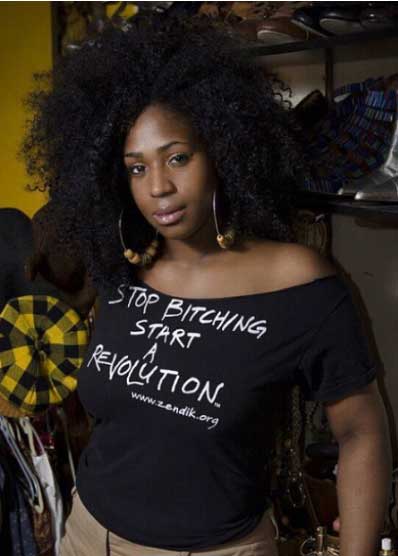 An award-winning Haitian-American educator, organizer, and poet from Boston, Ashley-Rose's poetry has been featured in "The Anthology of Liberation Poetry," alongside the work of Tony Hoagland and Black Arts Movement co-founder Askia M. Touré. She gave one of the first TEDex talks in Boston based on her poem "The Other Side of Ruggles." As a storyteller, she's also been featured on PBS's "Stories from the Stage." Ashley-Rose was honored by Mayor Marty Walsh with the OneIn3 Impact Award as one of the most influential people under age 35 in Boston. In 2016 she was awarded Boston's Extraordinary Woman Award for her work with arts, education, and community development in Boston.
An award-winning Haitian-American educator, organizer, and poet from Boston, Ashley-Rose's poetry has been featured in "The Anthology of Liberation Poetry," alongside the work of Tony Hoagland and Black Arts Movement co-founder Askia M. Touré. She gave one of the first TEDex talks in Boston based on her poem "The Other Side of Ruggles." As a storyteller, she's also been featured on PBS's "Stories from the Stage." Ashley-Rose was honored by Mayor Marty Walsh with the OneIn3 Impact Award as one of the most influential people under age 35 in Boston. In 2016 she was awarded Boston's Extraordinary Woman Award for her work with arts, education, and community development in Boston.
A dance artist/educator, certified yoga teacher, and writer, Melissa Alexis (MFA Dance, Sarah Lawrence College) founded Cultural Fabric & The Healing Arts Institute to foster mindfulness through movement in service of healing justice and inclusion. A first-generation Trinidadian-American, her movement research is rooted in exploring the intersection of African, Eastern and Western perspectives, as well as psychology, social justice, sustainability and mindfulness studies.
Sponsored by the Minor in Creativity, the Arts, and Social Transformation (CAST) and cosponsored by the English department
An open session of AMST/MUS 39B — Protest Through Song: Music that Shaped America
Featured speakers:
- Daniel Kryder, Louis Stulberg Chair in Law and Politics, Brandeis University
- Maria Madison, Associate Dean for Equity, Inclusion and Diversity, Heller School for Social Policy and Management
- Sandra Nicolucci, Associate Professor Emerta in Music Education, Boston University
Co-sponsored by the Minor in Creativity, the Arts, and Social Transformation, Brandeis University Library, the Office of the Dean of Arts and Sciences, the Heller Office of the Dean and Sankofa Events, the Office of Diversity, Equity and Inclusion, the Division of Creative Arts, the Department of African and African American Studies, and the Department of Politics.
"Let's Make a Better World: Stories and Songs" by Jane Sapp is a new resource for music educators, chorus leaders, activists and cultural workers. In it, the nationally admired cultural worker, musician, educator, and activist, Jane Wilburn Sapp, shares her approach to social transformation and its roots in African-American musical traditions.
In the book, Jane tells the story of her childhood, nurtured by the Black community while living in the brutal world of the Jim Crow South. She describes her participation in the Black Power movement and introduces us to her mentors. She shares 25 songs she has written with young people and sung with people of all ages, and tells the stories behind each song and offers suggestions or teachers and chorus leaders. The book also includes scores, and all of the songs can be heard on podcasts where Jane's approach to cultural work is illuminated through conversations with activists, cultural workers and music educators.
Purchase the bookFebruary 2019
Come listen to Daniel Bryan, executive director of The Pachaysana Institute and resident director of Rehearsing Change: Empowering Locally, Educating Globally. Bryan will be discussing the work of Rehearsing Change, which responds to the need for more participatory dialogue — such as theatre and performance - to engage with education about fair trade and decolonization.
These events were sponsored by the Minor in Creativity, the Arts, and Social Transformation (CAST). Co-sponsored by the Minor in Peace, Conflict, and Coexistence Studies.
Work with Daniel Bryan, executive director of The Pachaysana Institute and resident director of Rehearsing Change: Empowering Locally, Educating Globally, as he uses participatory theatre activities to explore how education can perpetuate colonial structures. Bryan will also be examining how we can move towards the decolonization of our practices.
These events are sponsored by the Minor in Creativity, the Arts, and Social Transformation (CAST). Co-sponsored by the Minor in Peace, Conflict, and Coexistence Studies.